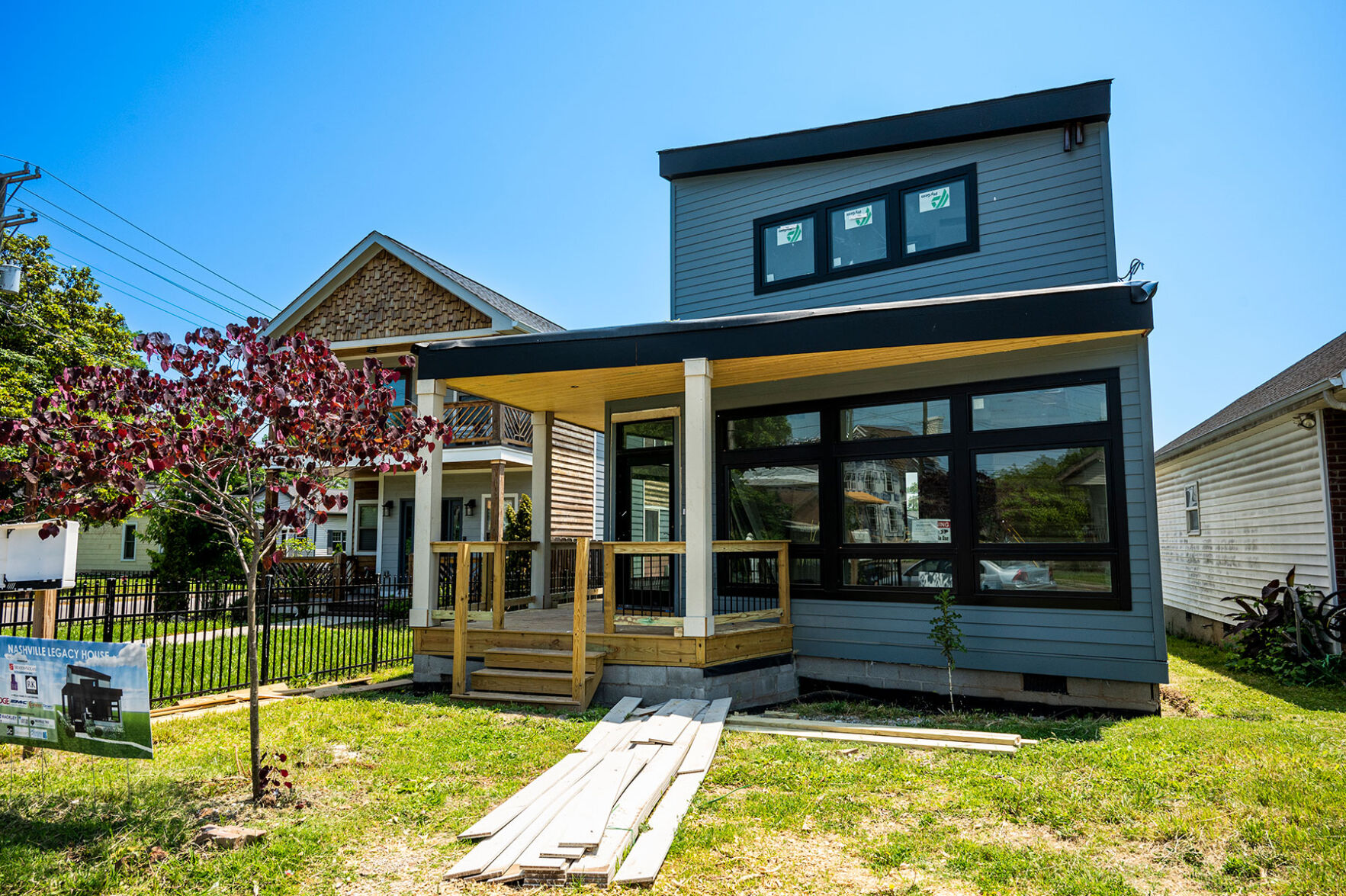Street View is a monthly column in which we’ll take a close look at development-related issues affecting different neighborhoods throughout the city.
On Maury Street in South Nashville, construction is nearly complete on a new house. It looks like many other Nashville properties: a residential construction site in a rapidly changing city.
But this house doesn’t face the same market pressures as the ones around it. Owned by local nonprofit The Housing Fund, it’s designed to make homeownership attainable by people who earn less than 80 percent of Nashville’s median income. Through a Community Land Trust program, The Housing Fund keeps the title to the land a home is built on, leasing the land to the homeowner. This allows the nonprofit to sell the home at a much more affordable price. As the Scene’s Alejandro Ramirez previously reported, The Housing Fund’s model helps people who have historically faced housing discrimination build generational wealth.
Affordability isn’t the only unique feature of the house on Maury Street. It also sits on a significant housing resource: one of the hundreds of vacant residential land parcels owned by the Metro Nashville government. These parcels often come into Metro’s possession because of unpaid tax debts. Now they’re part of a citywide initiative to create more affordable housing.
Angie Hubbard is the director of the Metro Housing Division. “The Public Property Office periodically sends the Housing Division a list of tax-delinquent parcels that are ready for disposal,” says Hubbard in an email to the Scene. From there, she explains, the Housing Division assesses whether these properties are “buildable.” Among other constraints, they need to meet a minimum size, not be in floodplains or other hazardous areas, and have street frontage — meaning the property line is directly next to a street.
If lots meet the Metro Housing Division’s requirements, then that department seeks approval from the Metro Council. After that, they can allocate lots to nonprofits through a partnership with the Barnes Housing Trust Fund.
So far, Hubbard says, Metro has awarded more than 100 properties to nonprofits, and plans to award six more soon. “We hope that these will come before council in July or August,” she says.
The Housing Fund owns 15 of these properties. The fund finished its first Community Land Trust property in January of last year and completed another a few months later. The Maury Street house will be its third finished property.
Once nonprofits acquire Metro property, they often face complications with the land’s title. “Nonprofits who have been awarded property have borne the time and costs of clearing title before developing the sites,” says Hubbard. “We are proposing to address this issue with our Fiscal Year 2024 funding request to create a mechanism for Metro to clear title and help bring the properties online faster.”

Home on Maury Street owned by The Housing Fund
Alisha Haddock is senior vice president and director of community and economic development at The Housing Fund. She says despite logistical challenges, the Community Land Trust program is an effective way to make first-time home buying possible.
“Clearing the titles so we can build on the land has been our biggest hurdle,” she says. “But other than that, this program has proven to be a successful tool and mechanism to activate land, keep it permanently affordable, but also create homeownership opportunities for people.”
The Housing Fund built its two latest properties in partnership with Moody Nolan, an architecture firm that donated its time and resources to help build the homes.
Of note, the home is also the subject of a recent lawsuit. On May 16, Nashville Lumber Co. filed a suit against The Housing Fund and its contractor, RK Junior LLC, alleging that The Housing Fund and RK Junior failed to pay for materials used for the Maury Street home and another property on Argyle Avenue. RK Junior did not respond to multiple requests to comment on the case, and attorneys for Nashville Lumber Co. declined to comment.
When asked about the case, The Housing Fund sent a statement reading, in part: “In the case of 97 Maury St., THF had a unique opportunity to partner with the local office of Moody Nolan — a prominent, minority-owned architectural firm with a 40-year history of development success. The firm’s Legacy Project is its philanthropic endeavor to provide under-resourced neighborhoods with architecturally modern houses, modeling a new approach to affordable housing. The national post-pandemic economic climate, combined with Nashville’s ongoing and rapid growth, has resulted in many labor/materials constraints for area builder-developers to navigate. Moody Nolan is currently working diligently with its General Contractor to resolve any outstanding construction challenges, and a new home at 97 Maury St. is approaching total completion.”
Hubbard says that if approved, the Fiscal Year 2024 budget will include three new Planning Division positions, which will focus on “planning and design services for Metro properties, including surplus MNPS property, and would allow Metro to explore the co-location of public/community spaces and housing options.” These efforts could help streamline the development process for nonprofits like The Housing Fund.
The 2021 Affordable Housing Task Force report suggested that in order to meet projected housing needs, Nashville needs to create 52,498 new affordable units by 2030. The report also recommended that The Housing Division audit its existing properties to find potential affordable housing sites.
Programs like The Housing Fund can help mitigate affordability and equity issues, but Haddock says they need to be part of a bigger picture. She hopes to see people and organizations beyond Metro get involved with housing equity. For example, she suggests, churches could join in by leasing or selling unused land to help people in need, and private companies can donate time and services.
“It can’t just be The Housing Fund, it can’t just be the local government, it can’t just be the Barnes Fund,” Haddock says. “It will have to take all of us. This is a space where everybody can play a part.”






